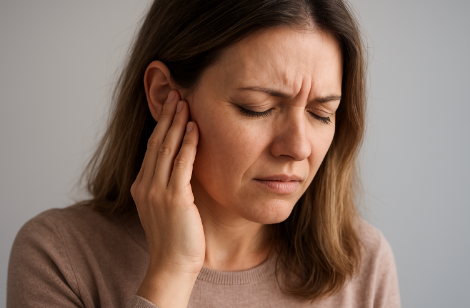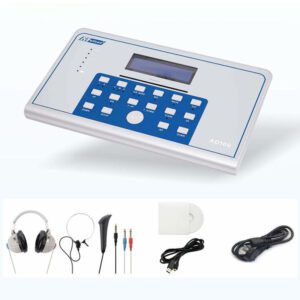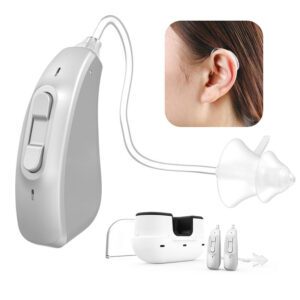Sudden hearing Loss, also known as sudden sensorineural hearing loss (SSHL), is a frightening and unexpected condition where a person experiences a rapid decline in hearing ability, usually within 72 hours. This condition often occurs without warning and can significantly disrupt daily life, communication, and emotional well-being. Understanding the most common cause of sudden hearing loss and exploring effective treatment options, including the use of modern hearing Aids, is essential for anyone facing this challenge.

What Is Sudden Hearing Loss?
Sudden hearing loss is defined as a rapid, unexplained loss of hearing, typically in one ear. Patients may wake up unable to hear well, or they may notice a muffled or blocked sensation in one ear. Other symptoms often include:
Tinnitus (ringing in the ears)
Vertigo or dizziness
Ear fullness or pressure
Difficulty understanding speech, especially in noisy environments
This condition can happen to anyone, regardless of age, although it is more common in adults between 40 and 60 years old.
The Most Common Cause of Sudden Hearing Loss
The leading cause of sudden hearing loss is inner ear blood circulation problems or viral infections.
Viral Infections – Viruses such as those causing the common cold or flu can attack the inner ear, damaging delicate hair cells in the cochlea responsible for hearing.
Circulatory Issues – Reduced blood flow to the inner ear can lead to oxygen deprivation, causing sudden and severe damage to auditory cells.
These causes explain why sudden hearing loss often appears suddenly and why early treatment is so critical.
Other Possible Causes of Sudden Hearing Loss
While viral infection and blood flow issues are the most common, there are several other factors that can lead to sudden hearing loss:
Exposure to loud noise or acoustic trauma
Head or ear injury
Ototoxic medications (such as certain antibiotics or chemotherapy drugs)
Autoimmune diseases that attack the inner ear
Neurological conditions such as multiple sclerosis
Tumors affecting the auditory nerve (though rare)
Risk Factors
Certain lifestyle and health conditions increase the likelihood of experiencing sudden hearing loss:
High blood pressure and cardiovascular disease
Diabetes and poor circulation
Smoking and excessive alcohol consumption
High levels of stress
Prolonged exposure to loud environments
Recognizing and managing these risks can help reduce the chances of developing sudden hearing problems.
Diagnosis and the Importance of Early Intervention
Medical professionals diagnose sudden hearing loss through:
Audiometric testing – to measure hearing levels across frequencies
Blood tests – to check for infections or autoimmune activity
Imaging (MRI/CT scans) – to rule out tumors or structural issues
The golden window for treatment is within the first 72 hours. Immediate medical consultation is crucial because early therapy can often restore some or all of the lost hearing. Delays may lead to permanent damage.
Treatment Options for Sudden Hearing Loss
Corticosteroids – The most common treatment, which reduces inflammation and swelling in the inner ear.
Antiviral medications – Prescribed when viral infection is suspected.
Hyperbaric oxygen therapy – Improves oxygen delivery to damaged inner ear cells.
Supportive care – Managing underlying health conditions like high blood pressure or diabetes.
Despite treatment, not all patients regain their hearing completely. This is where hearing aids can play a transformative role.
The Role of Hearing Aids in Recovery and Daily Life
For individuals who do not fully recover their hearing after treatment, hearing aids can significantly improve quality of life:
Amplification of residual hearing – hearing Aids enhance sounds in the frequencies where hearing is weak.
Improved speech understanding – Modern devices filter background noise, allowing clearer conversations.
Connectivity – Bluetooth-enabled hearing aids connect with smartphones, TVs, and computers for seamless listening.
Comfortable design – Discreet, lightweight, and customized to individual hearing loss patterns.
Many patients with unilateral sudden hearing loss find relief with specialized CROS (Contralateral Routing of Signals) hearing aids, which transmit sound from the weaker ear to the stronger one, restoring balance in listening.
Prevention and Long-Term hearing Health
While sudden hearing loss cannot always be prevented, certain habits can reduce risks:
Avoid prolonged loud noise exposure and wear ear protection when necessary
Manage cardiovascular health through exercise and diet
Limit alcohol and quit smoking
Get regular hearing check-ups, especially if there is a family history of hearing loss
Consider hearing aids early if permanent hearing loss occurs to avoid auditory deprivation and cognitive decline
Conclusion
The most common cause of sudden hearing loss is inner ear circulation problems or viral infection. While treatments such as corticosteroids and oxygen therapy may restore hearing, some patients experience permanent loss. In these cases, hearing aids provide an effective solution, helping individuals regain confidence, communication ability, and quality of life.
If you or someone you know experiences sudden hearing loss, seek medical attention immediately. And if recovery is incomplete, remember that modern hearing aids are powerful tools that can bridge the gap between hearing loss and a full, connected life.


